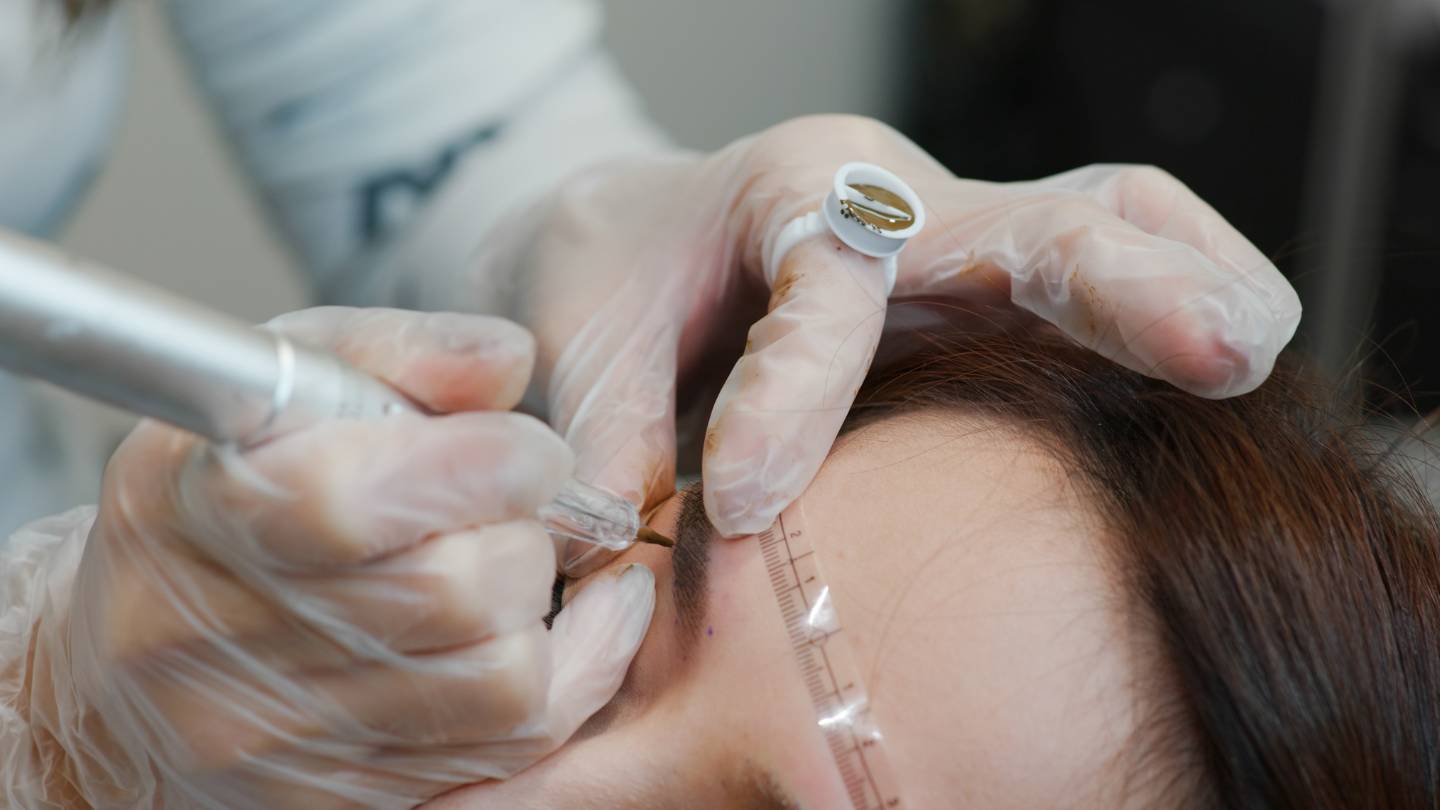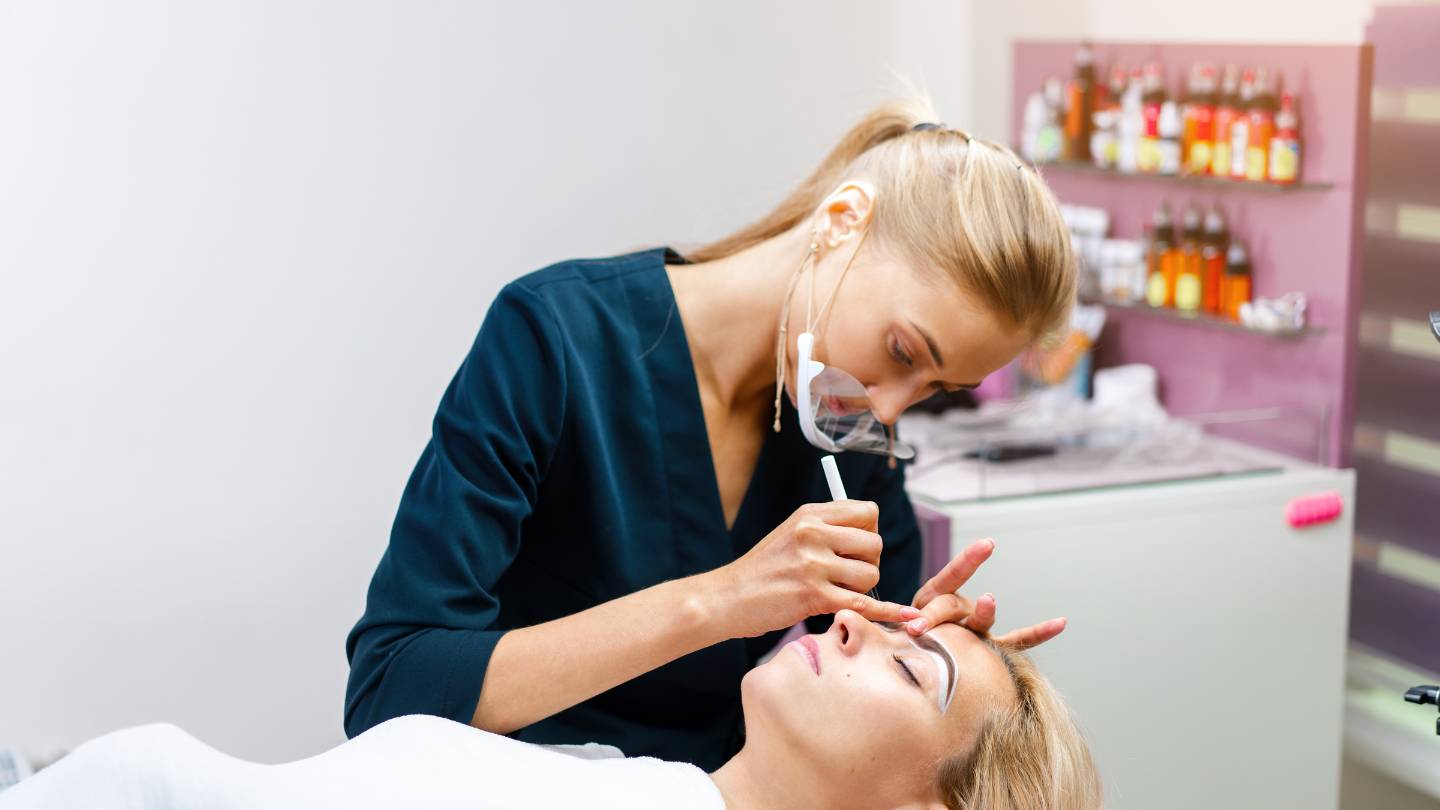Microblading is a semi-permanent cosmetic procedure that enhances the appearance of eyebrows by implanting pigment into the skin. While the results can be stunning, the question remains: Can individuals with skin conditions safely undergo microblading?
The answer depends on your skin type, how it affects your skin, and whether or not the procedure may aggravate the condition. Below, we’ll address specific skin conditions and explain whether microblading is appropriate.
Let’s get straight to the point
Microblading can enhance eyebrows, but certain skin conditions may make the procedure unsafe. Individuals with eczema, psoriasis, dermatitis, acne, keloid-prone skin, sensitive skin, or autoimmune diseases should exercise caution, as microblading can aggravate symptoms, trigger flare-ups, or lead to infections.
Those with oily skin may experience faster pigment fading and blurred strokes. If you have any of these conditions, it’s essential to consult both a dermatologist and a certified microblading artist before proceeding.
Healthy, normal, or well-controlled skin conditions are best suited for microblading. Always ensure proper hygiene and aftercare to achieve optimal results.
Microblading And Eczema
Eczema is a chronic skin condition that causes dry, itchy, and inflamed skin. For those wondering if they can get microblading with eczema, the answer is generally no. The nature of eczema can make your skin highly sensitive, and microblading can worsen the symptoms.
Why Microblading Might Aggravate Eczema
- Dryness and Flaking: Eczema-affected skin tends to be dry and flaky, which can interfere with the healing process of microblading.
- Sensitivity to Pigment: The introduction of pigments into the skin can cause irritation and trigger flare-ups.
- Increased Risk of Infection: Skin with active eczema is more vulnerable to infections, and the small incisions made during microblading increase this risk.
Recommendation For Eczema Patients
- Avoid microblading during an active flare-up.
- Consult a dermatologist before considering the procedure.
- Consider other, less invasive cosmetic options that won’t aggravate the skin.
Microblading And Psoriasis
Psoriasis is an autoimmune condition that causes skin cells to build up rapidly, forming scales and red patches that can be itchy and sometimes painful. For people with psoriasis, microblading is typically not recommended.
Why Psoriasis Patients Should Avoid Microblading
- Flare-Ups: Microblading can cause trauma to the skin, potentially triggering psoriasis flare-ups.
- Inconsistent Healing: Due to the irregular nature of psoriatic skin, the microblading pigment may not heal evenly, resulting in an uneven appearance.
- Koebner Phenomenon: This phenomenon occurs when new psoriasis lesions form at the site of skin injury, such as the small incisions made during microblading.
Recommendation For Psoriasis Patients
- Avoid microblading if you have active psoriasis in the eyebrow area.
- If your psoriasis is under control and not active, consult both a dermatologist and a licensed microblading artist to assess if you are a suitable candidate.
Microblading And Dermatitis
Dermatitis is an umbrella term for skin irritation or inflammation, including conditions like atopic dermatitis, seborrhoeic dermatitis, and contact dermatitis. If you suffer from any form of dermatitis, it’s essential to understand how microblading could affect your condition.
Why Microblading Could Worsen Dermatitis
- Increased Inflammation: Microblading can introduce foreign materials (pigments) into the skin, potentially triggering an inflammatory response.
- Potential Allergies: People with contact dermatitis may be allergic to certain pigments or numbing creams used during the procedure.
- Longer Healing Time: Dermatitis-affected skin may have a longer recovery period, and irritation could lead to a poorer outcome.
Recommendation For Dermatitis Patients
- Always test the pigment and numbing cream on a small patch of skin before the procedure.
- If dermatitis is well-managed, you might still be a candidate, but you should carefully consult with your microblading artist and doctor.
Microblading And Acne
Many people with acne or skin prone to breakouts might wonder if they are suitable candidates for microblading. The answer is that it depends on the severity and location of the acne.
If you have active acne in the eyebrow area, it’s generally advisable to avoid microblading.
Why Microblading Could Aggravate Acne
- Risk of Infection: Microblading introduces small cuts into the skin, and if done over acne lesions, it increases the risk of infection.
- Delayed Healing: Acne-prone skin, especially when inflamed, can take longer to heal, leading to suboptimal results.
- Pigment Blurring: The oiliness often associated with acne-prone skin can cause the pigment to blur or fade more quickly.
Recommendation For Acne-Prone Skin
- Avoid microblading during an active breakout in the eyebrow area.
- If your acne is under control, consult with your microblading artist to ensure your skin can handle the procedure without complications.
Microblading And Oily Skin
Oily skin presents some specific challenges when it comes to microblading, but it doesn’t necessarily mean the procedure is off-limits. Oily skin tends to produce more sebum, which can cause faster pigment fading and a softer look.
Considerations For Oily Skin
- Pigment Fading: Excess oil production can cause the pigment to fade more quickly, leading to the need for more frequent touch-ups.
- Blurring of Hair Strokes: Because oily skin doesn’t hold pigment as well, the fine hair strokes can blur together over time.
- Extended Healing Process: Oily skin may require more aftercare and a longer healing time compared to other skin types.
Recommendations For Oily Skin
- Choose a skilled microblading artist who understands how to work with oily skin and can create strokes that hold their definition.
- Be prepared for more frequent touch-ups to maintain the desired look.
Microblading And Sensitive Skin
Sensitive skin requires special consideration when it comes to any cosmetic procedure, including microblading. People with sensitive skin tend to experience more irritation, redness, and swelling after the procedure.
Why Sensitive Skin May React Differently
- Prolonged Redness: Individuals with sensitive skin often experience a pinkish flush that persists longer than usual, sometimes for days or even weeks.
- Increased Swelling: Sensitive skin tends to swell more easily during and after the procedure.
- Slow Healing: The healing process may be slower, and sensitive skin may be more prone to irritation from the pigment and aftercare products.
Recommendation For Sensitive Skin
- Discuss your concerns with the microblading artist beforehand to ensure they take extra precautions during the procedure.
- Consider doing a patch test with the pigment to check for any potential allergic reactions.
Microblading And Keloid Scarring
Keloids are raised scars that can form after trauma to the skin, and people who are prone to keloids should be cautious about microblading. The small incisions made during the procedure can trigger the formation of new keloids, which could result in unwanted scarring.
Why Keloid-Prone Individuals Should Avoid Microblading
- High Risk of Scarring: Microblading involves creating tiny incisions, and for those prone to keloids, these cuts may result in raised scars.
- Poor Aesthetic Outcome: Keloid scars can distort the appearance of the eyebrows, making the results of microblading unpredictable.
Recommendation For Keloid-Prone Skin
- If you have a history of keloid scars, it’s best to avoid microblading altogether to prevent unwanted scarring.
Microblading And Autoimmune Diseases
People with autoimmune diseases such as lupus or frontal fibrosing alopecia have a weakened immune system, making them more susceptible to infections. Microblading may not be suitable for individuals with autoimmune disorders.
Why Autoimmune Disease Affects Microblading
- Risk of Infection: Weakened immune systems mean a higher risk of infections during the healing process.
- Compromised Healing: The healing process may be prolonged or compromised, affecting the final results of microblading.
- Exacerbation of Symptoms: In some cases, microblading may trigger a flare-up of autoimmune symptoms.
Recommendation For Autoimmune Disease Patients
- Consult both your doctor and a trained microblading artist before considering the procedure.
- Be aware of the potential risks and ensure that the microblading environment is sanitised to prevent infection.
Who Can Safely Get Microblading?
While certain skin conditions make microblading unsafe, many individuals with healthy skin or well-controlled conditions can still benefit from the procedure. Here are some general guidelines on who can safely get microblading:
Suitable Candidates
- Normal skin: Heals well and maintains pigment evenly.
- Dry skin: Holds pigment for a longer period, often resulting in crisp, well-defined strokes.
- Combination skin: Typically heals similarly to normal skin, although the oilier t-zone may require more maintenance.
Important Considerations
- Choose a qualified artist: Always ensure your microblading artist is certified and follows strict hygiene standards.
- Follow aftercare instructions: Proper aftercare is essential to prevent infections and ensure the longevity of the pigment.
- Patch testing: If you are unsure whether your skin will react to the pigment.
Conclusion
Microblading can be a fantastic option for enhancing your eyebrows, but assessing whether it is appropriate for your specific skin condition is essential. For individuals with eczema, psoriasis, dermatitis, acne, oily skin, sensitive skin, keloid-prone skin, or autoimmune diseases, extra caution must be taken.
Consult with a dermatologist and a qualified microblading artist before proceeding. Healthy, normal, or well-controlled skin conditions are typically the best candidates for microblading.
Always prioritise safety, hygiene, and aftercare to achieve the best possible results while minimising any risks associated with the procedure.
FAQs About Microblading
Can I Get Microblading If I Have Sensitive Skin?
Individuals with sensitive skin can still undergo microblading, but informing the technician about your skin condition is crucial. A patch test may be recommended to ensure that the pigments and the procedure won’t cause adverse reactions.
Is Microblading Suitable For Oily Skin Types?
Yes, microblading can be done on oily skin. However, oily skin may affect the longevity of the results, as the pigment may fade faster. Proper aftercare and touch-ups may be needed to maintain the desired look.
Can I Undergo Microblading If I Have Dry Skin?
Yes, individuals with dry skin can have microblading done. However, exercising before and after the procedure is essential to ensure optimal healing and pigment retention.
What About If I Have Acne-Prone Skin?
Microblading can be performed on individuals with acne-prone skin, but it’s crucial to have a consultation with the technician. They can assess your skin’s condition and advise on the best action. It’s important to avoid active breakouts during the procedure.
Can I Get Microblading If I Have A History Of Keloid Scarring?
Individuals with a history of keloid scarring should approach microblading with caution. Keloids are an overgrowth of scar tissue, and the microblading process involves creating small incisions in the skin. Consult a dermatologist or a microblading technician to assess the risk and potential complications.


